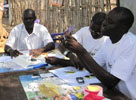
This piece originally appeared in Global Post.
JUBA, Sudan — While celebrations marked the inauguration of Sudan president Omar al-Bashir to another term of office in Khartoum, the mood was more somber and determined in southern Sudan. The people of southern Sudan are looking ahead to the referendum in January 2011 when they will vote to determine if the south can secede to become an independent country.
If all goes according to plan, African’s largest country will be well on its way to “divorce” by this time next year.
But before the referendum — viewed as the real “end game” for the South — can take place, the two parties to the Comprehensive Peace Agreement (CPA) must wrap up the electoral process and forge ahead into a gauntlet of negotiations over the future of Sudan, regardless of whether it remains one country or becomes two separate nations.
The elections took more than two years and cost hundreds of millions of donor dollars to pull off. Significant diplomatic capital has been expended in hemming and hawing over the international community’s response to elections that returned an indicted war criminal to power.
The “check the box” mentality toward the elections was the tacit approach of many international actors, including the Obama administration. This conflict prevention-focused strategy suggested that the elections were necessary to keep the peace agreement on track, because a breakdown of this agreement would almost certainly spark a return to all-out North-South war.
There’s arguably a serious discussion needed about the merits, disadvantages, and long-term consequences of significantly lowering the credibility bar of Sudan’s elections in order to clear yet another CPA hurdle.
Now that the new governments have been formed in Khartoum and here in Juba, the southern capital, Sudan’s two ruling parties and the international actors with a stake in the future of the country have shifted their attention to the unpredictable period ahead.
In the seven-month run-up to the South’s referendum on independence in January, the National Congress Party-led regime in Khartoum and the guerrillas-turned-politicians of the Sudan People’s Liberation Movement will need to engage in more of the deal-making and elite bargaining that characterized the recent political dramas in Sudan prior to the elections. A myriad number of hot-button issues — from the sharing of oil-revenues following the referendum to the demarcation of the North-South border — must be resolved before southerners return to the polls in January.
Before the elections are shelved and forgotten, it’s worth considering the lessons that all parties could learn from the process, given that it in the South, it was in some ways a “dry run” for the referendum.
Click here to continue reading.
Photo: Voter registration booth in Juba (Enough/Maggie Fick)

